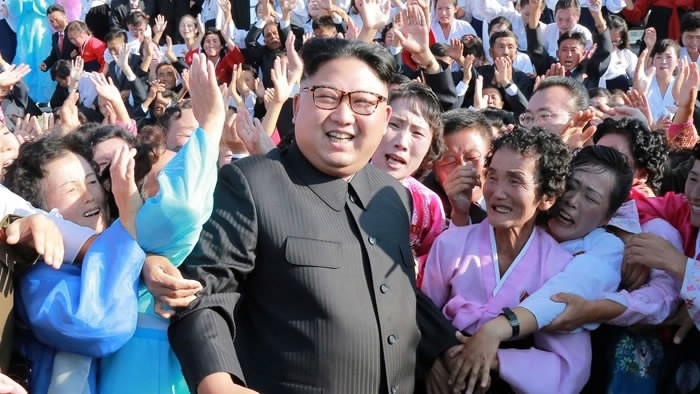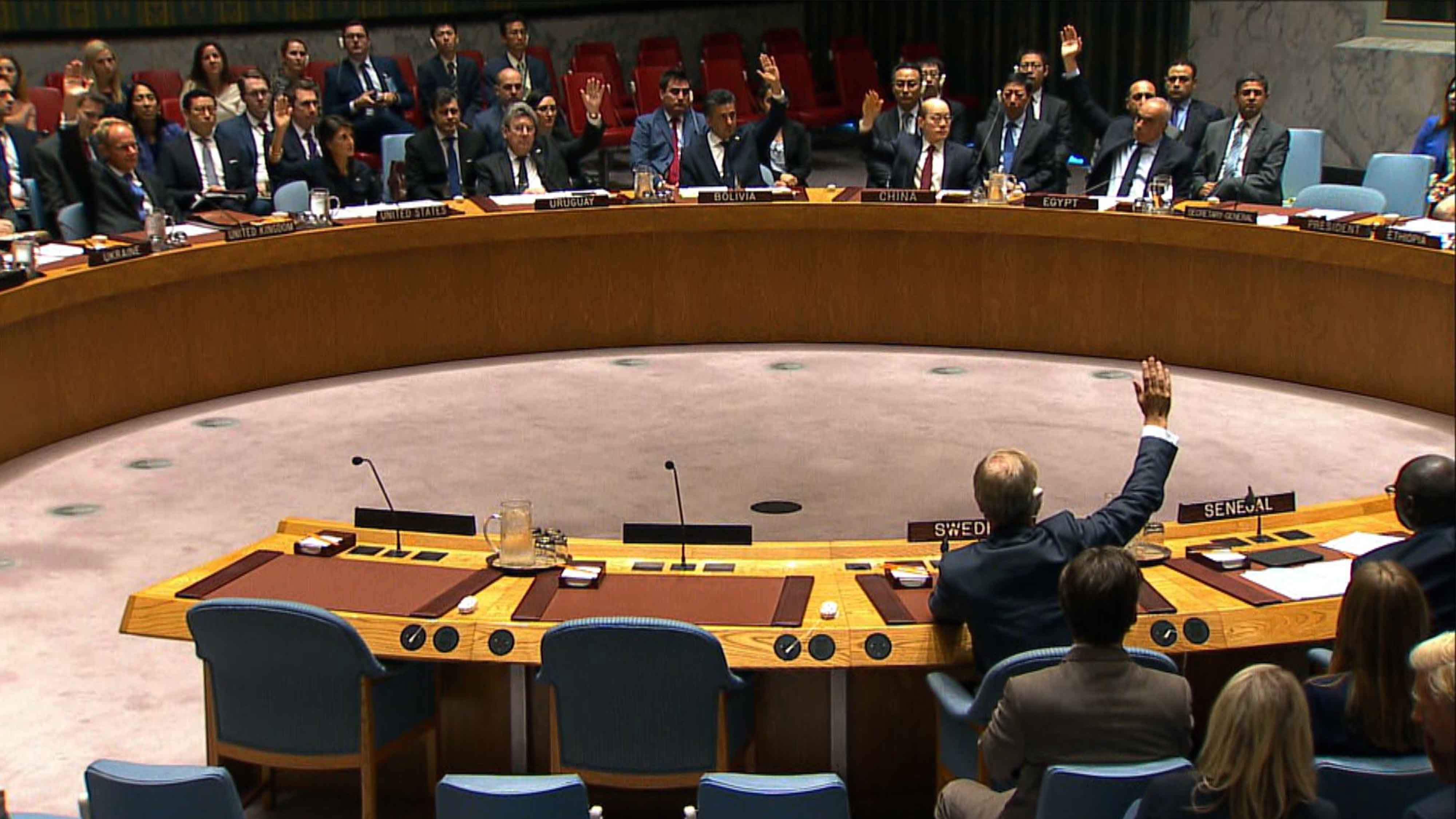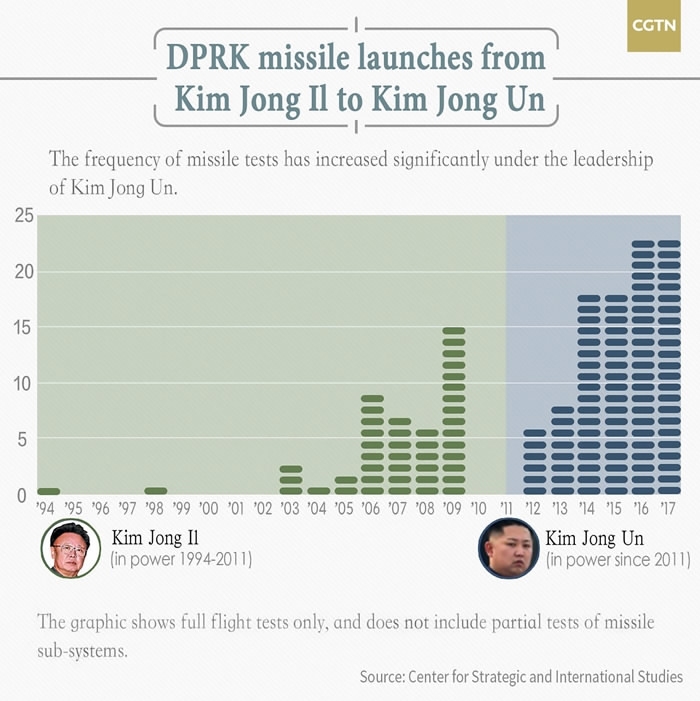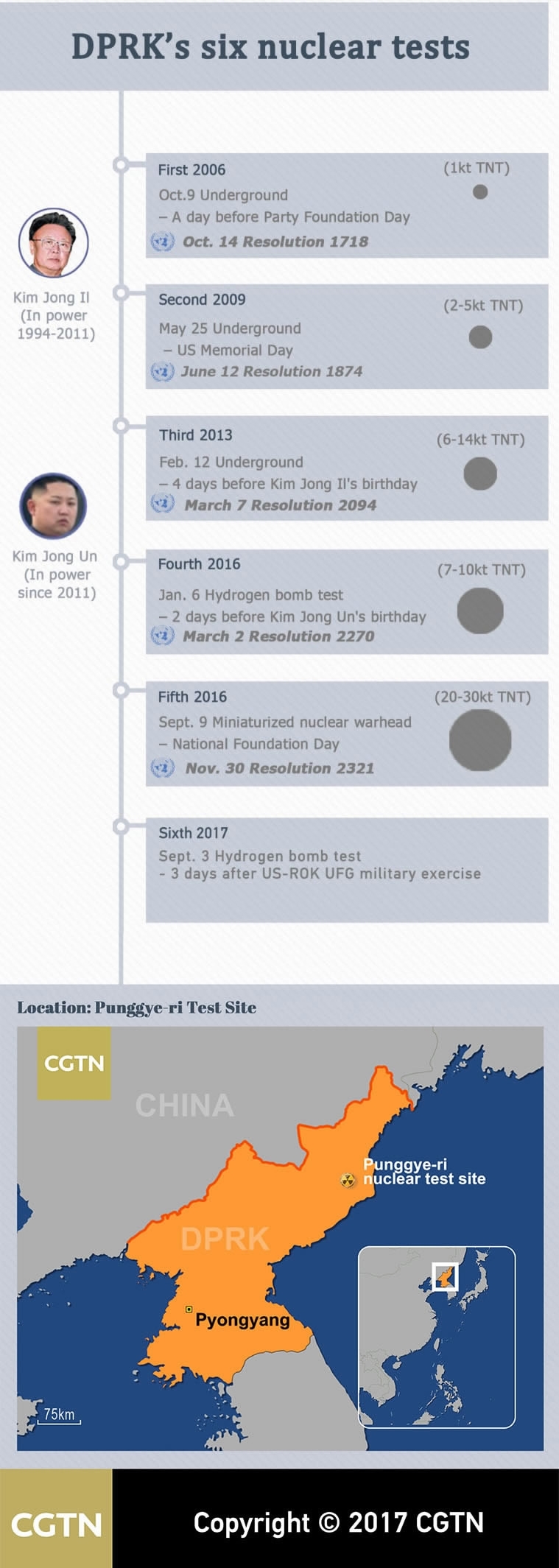The United Nations Security Council
unanimously stepped up sanctions against the DPRK on Monday, following the country's latest hydrogen bomb test on September 3.
The resolution – the ninth sanctions resolution unanimously adopted by the 15-member council since 2006 over Pyongyang's nuclear and missile programs – imposes a ban on the country's textile exports and caps its imports of crude oil.
Repeated sanctions have so far failed to deter the DPRK from continuing with its weapon development. On the contrary, it has been testing more powerful bombs with a higher frequency in recent years.
There is a big question mark over whether Monday's resolution will make any difference.
How serious are the sanctions?
The latest resolution has banned the DPRK from exporting textiles. This was its second-biggest export after coal and other minerals in 2016, totaling 752 million US dollars, according to data from the Korea Trade-Investment Promotion Agency.
The Security Council has also imposed a ban on condensates and natural gas liquids, a cap of two million barrels a year on refined petroleum products, and a cap on crude oil exports to the DPRK at current levels.
A US official familiar with the council negotiations and speaking on condition of anonymity told Reuters that the DPRK imported some 4.5 million barrels of refined petroleum products annually and four million barrels of crude oil.
A tougher initial US draft, which included proposals for an oil embargo and naval blockade, was weakened to win the support of China and Russia, according to the Reuters report.
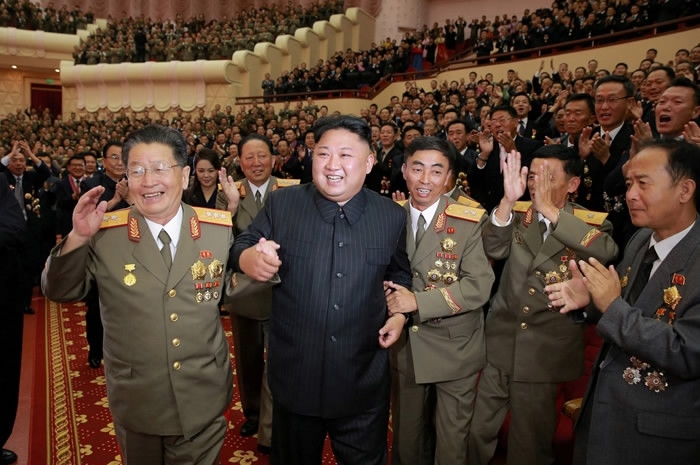
DPRK leader Kim Jong Un (L2, front) attends a celebration for nuclear scientists and engineers who contributed to a hydrogen bomb test on September 3, 2017. /Reuters Photo
DPRK leader Kim Jong Un (L2, front) attends a celebration for nuclear scientists and engineers who contributed to a hydrogen bomb test on September 3, 2017. /Reuters Photo
US Ambassador to the UN Nikki Haley credited a "strong relationship" between US President Donald Trump and Chinese President Xi Jinping for the successful resolution negotiations. Xi and Trump had
a telephone conversation over the situation on the Korean Peninsula last Wednesday.
Haley threatened to "continue with further pressure" if the DPRK refuses to stop its nuclear program.
Pyongyang warned the United States on Monday that it would pay a "due price" for spearheading efforts on UN sanctions, vowing to "tame the US gangsters by taking a series of actions tougher than they have ever envisaged".
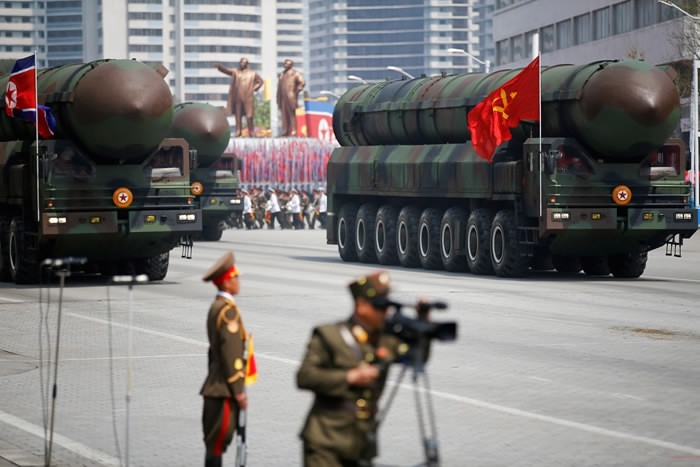
The DPRK presents its intercontinental ballistic missiles (ICBMs) during a military parade marking the 105th birth anniversary of the country's founding father Kim Il Sung in Pyongyang, April 15, 2017. /Reuters Photo
The DPRK presents its intercontinental ballistic missiles (ICBMs) during a military parade marking the 105th birth anniversary of the country's founding father Kim Il Sung in Pyongyang, April 15, 2017. /Reuters Photo
Previous resolutions fail to deter DPRK
The US has been vocal in pushing for tougher sanctions against the DPRK, hoping that a combination of UN and bilateral punitive measures would persuade Pyongyang to halt its controversial military activities. Nonetheless, the UN Panel of Experts tasked with monitoring the DPRK said the implementation of the resolutions by UN member states "remains insufficient and highly inconsistent".
"The DPRK is flouting sanctions through trade in prohibited goods, with evasion techniques that are increasing in scale, scope and sophistication," said a report by the committee in February.
According to the report, the DPRK managed to set up companies abroad, participate in prominent regional arms fairs and sell high-end arms and related materials in multiple countries, in defiance of the sanctions.
Pyongyang's companies and banks on the UN sanctions blacklist have continued to operate, using agents, foreign nationals and entities in moving money, people and goods, including arms and materials, across borders and conceal financial activities.
"There are very few examples where sanctions have actually succeeded," said Nicholas Burns, a former US diplomat in the Bush administration.
Ironically, as sanctions toughened, the advancement of the DPRK's nuclear and missile program also accelerated.
In November 2016, the Security Council passed a resolution that capped the DPRK's coal exports and banned its exports of copper, nickel, zinc and silver.
The DPRK responded by firing more than 20 missiles in 2017, including
two intercontinental ballistic missiles that could potentially hit the US heartland.
A resolution passed on August 5 banned the export of coal, iron, iron ore, lead, lead ore and seafood from the DPRK. Pyongyang fired a missile over Japan and detonated a hydrogen bomb within a month.
The DPRK's sixth nuclear test was significantly more powerful than the atomic bombs dropped by the US on Hiroshima and Nagasaki during World War II, triggering a magnitude-6.3 earthquake.
Sanctions are needed, but…
Will the latest sanctions change the DPRK's behavior?
Research by the Peterson Institute for International Economics (PIIE) found that the more countries support the sanctions, the greater the chance they will work.
The fact that all the 15 members of the Security Council voted yes is an encouraging sign, highlighting support across the international community for the resolution.
Chinese Foreign Ministry spokesman Geng Shuang said on Tuesday that China hopes the resolution can be fully carried out. Russia also endorsed the new sanctions.
But worldwide support for the resolution does not guarantee it will be more successful than previous unanimously approved ones.
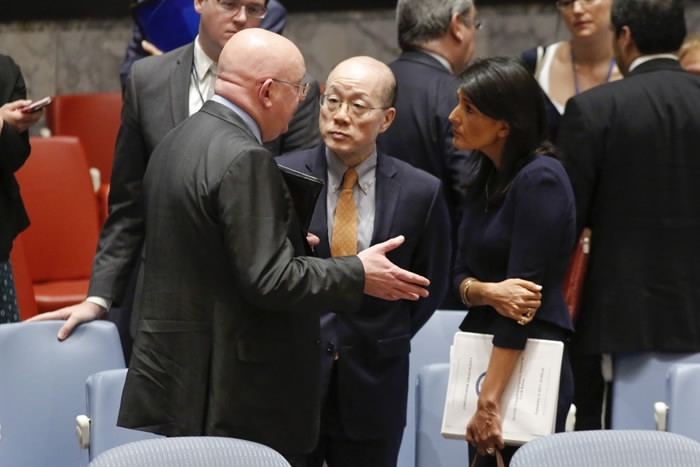
China's UN Ambassador Liu Jieyi (C), US UN Ambassador Nikki Haley (R) and Russian UN Ambassador Vasily Nebenzya (L) talk after a UN Security Council emergency meeting over the DPRK's nuclear test at UN Headquarters in New York, September 4, 2017. /AFP Photo
China's UN Ambassador Liu Jieyi (C), US UN Ambassador Nikki Haley (R) and Russian UN Ambassador Vasily Nebenzya (L) talk after a UN Security Council emergency meeting over the DPRK's nuclear test at UN Headquarters in New York, September 4, 2017. /AFP Photo
China has been calling for dialogue and peaceful negotiations on the issue over the years, saying sanctions alone are not enough.
"Sanctions are needed, but they are not the ultimate goal," Chinese Foreign Minister Wang Yi said on the sidelines of the ASEAN-China meeting in Manila in August.
Last week, Wang stressed that the key to solving the nuclear issue on the Korean Peninsula is both sanctions and dialogue.

